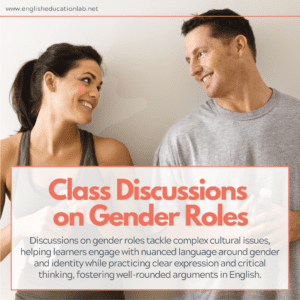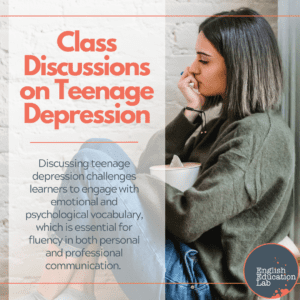
Speak up! Powerful ESL teaching material to get your advanced learners talking
Powerful ESL teaching material to get your advanced learners talking
Teaching advanced ESL learners can present unique challenges, particularly when the goal shifts from mastering basic language structures to achieving true fluency. Unlike beginners, advanced students have already built a strong foundation in grammar and vocabulary, yet they may still struggle with fluency, especially when confronted with complex, nuanced, or controversial topics.
At this stage, students are capable of understanding intricate sentence structures and vast amounts of vocabulary, but their ability to express ideas clearly and confidently often lags behind their comprehension skills. This is where carefully chosen ESL teaching material plays a crucial role in facilitating deeper, more meaningful conversation.
In ESL courses online, stimulating advanced learners to speak up and actively participate requires a thoughtful approach. While they may be competent in day-to-day conversations, advanced learners often shy away from discussing more abstract or sensitive subjects, fearing that they might lack the necessary language skills to articulate their thoughts effectively. The challenge for ESL teachers is to push these students beyond their comfort zone, encouraging them to engage in dialogues that require critical thinking, emotional intelligence, and a higher level of linguistic complexity.
Choosing the right teaching material becomes the key to success here. Materials designed for advanced learners should not only introduce new vocabulary and idiomatic expressions but should also challenge students to engage with complex ideas, construct well-reasoned arguments, and navigate culturally or socially charged topics. These discussions can bridge the gap between theoretical language knowledge and real-world language use, giving learners the practice they need to handle difficult conversations in both professional and social settings confidently.
Moreover, advanced learners thrive on relevance and engagement. Topics that resonate with their personal or professional interests are more likely to ignite passionate discussions, enhancing their motivation to participate. This is especially important in ESL courses online, where student engagement can sometimes be harder to maintain without the dynamic energy of a traditional classroom. When students are genuinely interested in the topics, they are more likely to contribute, question, and elaborate on ideas, leading to organic and enriching conversations that significantly boost fluency.
In this blog post, we’ll explore five powerfully effective ESL resources designed to foster conversation among advanced learners. These resources, which cover thought-provoking topics such as gender roles, cancel culture, and mental health, not only engage students but also provide an opportunity for them to articulate complex ideas, sharpen their critical thinking skills, and build the confidence necessary for high-level communication. By incorporating these materials into your ESL courses online, you can help your students unlock their full conversational potential, making them more adept at handling challenging discussions in both their personal and professional lives.
1. Class Discussions on Gender Roles – Conversation Starters Package
Gender roles are a subject that sparks rich, thought-provoking conversations, making it a perfect topic for advanced ESL learners. This package provides learners with prompts that explore both traditional and modern perspectives on gender roles, challenging them to discuss how these roles have evolved across different cultures and contexts. Whether students are expressing personal views or analyzing societal trends, the material encourages thoughtful exploration of a topic that may be new or unfamiliar to many.
Why it’s useful:
Discussions on gender roles delve into complex cultural and social issues, providing a unique opportunity for learners to engage with abstract and nuanced language. This material helps students navigate the intricacies of vocabulary related to gender, identity, and societal expectations, while also encouraging them to articulate their own views clearly and thoughtfully. The topic lends itself to exploring multiple perspectives, which forces learners to think critically and develop well-rounded arguments in English.
Given the diverse backgrounds of learners, this package is particularly useful for encouraging open dialogue and fostering cross-cultural understanding. It helps students express their thoughts on sensitive issues in a respectful and informed manner, developing both language fluency and emotional intelligence. The material also pushes learners to analyze and compare different viewpoints, refining their ability to structure logical arguments and engage in sophisticated discussions.
Ideal for both virtual and in-person classes, this package challenges learners to improve their command of abstract and analytical language—skills vital for academic and professional communication. By encouraging students to tackle sensitive topics like gender roles, the material provides a platform for developing the language skills necessary for expressing complex ideas fluently and confidently in English.
2. Class Discussions on Cancel Culture – Conversation Starters Package
Cancel culture is one of the most polarizing and widely debated issues in modern society, making it a rich topic for advanced ESL learners. This package offers a comprehensive foundation for engaging in thoughtful debates and discussions around the ethics, consequences, and cultural impact of cancel culture. Learners are prompted to explore key questions about personal accountability, freedom of speech, and societal justice, while reflecting on their own perspectives and the broader implications of this phenomenon.
Why it’s useful:
Debating cancel culture provides an excellent platform for learners to practice persuasive language, a critical skill for both academic and professional settings. The topic encourages students to analyze multiple perspectives, develop coherent arguments, and defend their viewpoints with clarity. Through this, they expand their vocabulary related to ethics, responsibility, and societal behavior—key areas of discussion when tackling complex social issues.
The material promotes critical thinking by encouraging learners to question the boundaries of accountability, the fairness of public shaming, and the role of media in shaping public opinion. Engaging in these debates helps students master advanced language structures, including how to articulate nuanced ideas, challenge opposing arguments respectfully, and navigate emotionally charged topics with a balanced tone.
For ESL learners, this topic also fosters cultural awareness, allowing them to explore how different societies perceive public accountability and free speech. As students grapple with these ethical questions, they become more adept at using high-level vocabulary and language strategies, making them better equipped for complex discussions in academic, professional, and social contexts.
This package is ideal for online or in-person classes, offering thought-provoking prompts that not only improve language skills but also encourage learners to engage in meaningful debates on a timely global issue. It’s perfect for students looking to develop critical thinking and communication skills that will serve them well in both personal and professional spheres.
3. Class Discussions on School Censorship – Conversation Starters Package
Censorship in schools, particularly around controversial books and educational materials, is a hotly debated issue that touches on the intersection of freedom of speech, education policy, and parental influence over what children learn. This conversation package equips learners with prompts that encourage deep, thoughtful discussions on these complex topics, exploring the reasons behind censorship, its impact on education, and the broader implications for society.
Why it’s useful:
For advanced ESL learners, engaging with complex topics like censorship fosters intellectual growth and language development simultaneously. This package challenges students to think critically about controversial issues, helping them practice articulating well-reasoned arguments and discussing nuanced ideas. The subject matter allows learners to explore multiple perspectives—whether defending freedom of expression, considering the role of education policies, or examining parental rights over school curricula.

The discussion prompts require students to use precise, sophisticated language as they debate sensitive topics, enhancing their ability to present structured, logical points. This skill is essential not only in academic settings but also in professional environments, where the ability to communicate complex ideas clearly and persuasively is a key marker of fluency. Moreover, the material encourages learners to develop balanced, respectful arguments, a critical component of effective communication in real-world debates.
By discussing school censorship, students also gain exposure to relevant social, political, and legal vocabulary, which enhances their ability to engage with current events and intellectual discourse. This resource prepares them for more advanced forms of communication, whether in academia, business, or social contexts, by giving them the tools to navigate controversial discussions with confidence and clarity.
The package is flexible for both virtual and in-person classes and provides a platform for thought-provoking, meaningful conversations that encourage critical thinking, emotional intelligence, and language mastery. It’s ideal for learners looking to expand their vocabulary and improve their ability to express sophisticated ideas in English.
4. Class Discussions on Teenage Depression- Conversation Starters Package
Teenage depression is a sensitive yet crucial topic that affects individuals and families worldwide. This conversation package provides a framework for advanced ESL learners to discuss the emotional, psychological, and societal dimensions of teenage depression. Through guided conversations, learners explore causes, symptoms, and coping strategies, as well as the impact of mental health stigma and the role of family, schools, and society in addressing the issue. The material encourages students to approach the topic with care and empathy while expanding their language skills.
Why it’s useful:
Discussing teenage depression challenges learners to engage with emotional and psychological vocabulary, which is essential for fluency in both personal and professional communication. This package provides an opportunity to explore a real-world issue that requires sensitivity and insight, helping students develop their ability to articulate complex emotions, mental health concepts, and social dynamics. As mental health becomes an increasingly important topic in global discourse, the ability to discuss it fluently in English is invaluable.
This material also fosters critical thinking, as learners analyze the societal, cultural, and environmental factors contributing to teenage depression. By engaging with this topic, students learn to express empathy, articulate nuanced perspectives, and discuss difficult topics in a supportive and respectful manner—skills that are important in both everyday conversations and professional settings, especially in fields such as education, healthcare, and social services.
For advanced ESL learners, this package strengthens the ability to communicate abstract ideas, make thoughtful arguments, and engage in deep, meaningful discussions. Whether used in virtual or in-person classes, the material equips learners to discuss sensitive issues with emotional intelligence and linguistic precision, enhancing their confidence in tackling challenging topics in English.
5. Class Discussions on Fears and Phobias – Conversation Starters Package
Fears and phobias are universal human experiences, ranging from common anxieties to deeply ingrained, sometimes irrational phobias. This conversation package offers learners a chance to explore both personal and societal perspectives on fear, encouraging them to share experiences while discussing the psychological, cultural, and emotional dimensions of fear. Topics include the science behind phobias, coping mechanisms, and the way fears impact decision-making and behavior in everyday life.
Why it’s useful:
This package is a powerful tool for expanding emotional and psychological vocabulary, allowing advanced ESL learners to practice articulating complex feelings and subjective experiences. By discussing fears and phobias, students develop the ability to describe mental states and emotional challenges, a skill that’s essential in both personal and professional settings. In informal conversations, being able to discuss emotions fluently fosters deeper connections with others, while in professional environments, the ability to describe one’s mental state or empathize with others is crucial for effective communication and leadership.
The material not only helps students become more fluent in expressing their own fears but also teaches them to approach sensitive topics with empathy and respect. This balance of personal vulnerability and structured conversation allows learners to become more confident in navigating difficult discussions, whether they’re talking about personal experiences or supporting others through emotional challenges. Additionally, by discussing the psychological aspects of fear, students can practice using specialized vocabulary related to mental health, making this package especially valuable for those working or studying in fields where emotional intelligence and the ability to articulate psychological states are important.
This package is versatile and can be used in various classroom settings—whether virtual or in-person—and provides a safe and supportive environment for learners to open up about their fears while building critical communication skills. It’s an ideal resource for fostering meaningful discussions that develop both language fluency and emotional awareness.
Why these ESL teaching materials work for advanced learners in ESL courses online
Each of the materials listed above serves a dual purpose: they stimulate intellectual conversation while pushing learners to use advanced language skills. ESL teaching material that deals with complex societal issues not only builds vocabulary but also teaches learners how to structure arguments, express opinions, and empathize with differing viewpoints.
Using these resources in ESL courses online allows teachers to facilitate discussions that mimic real-life conversations in both professional and social contexts, giving learners the confidence to speak on these topics outside the classroom. Additionally, because these topics are both controversial and relevant, they capture learners’ interest, ensuring that they are more motivated to participate and engage fully in class discussions!
Final thoughts
Selecting the right ESL teaching material is crucial for encouraging advanced learners to speak more confidently. By focusing on relevant, thought-provoking topics like gender roles, cancel culture, and mental health, you create an environment where students can push their linguistic limits while engaging with meaningful content. The resources provided by the English Education Lab offer a wealth of conversation starters that make it easier for students to express their thoughts clearly and fluently, helping them become more confident communicators in English. If you’re looking for our full library of resources, make sure you visit our ESL Resources for Teachers page. Happy teaching!
Struggling to get your ESL students talking? We’ve got you covered! Download our FREE ESL teacher’s survival kit now and transform your ESL lessons into dynamic, student-led conversations!
Subscribe to my YouTube Channel!
Further Reading
The question of time: How long does it take to learn English?
Why you should develop a growth mindset for language learning
Why high-quality teaching resources in the ESL classroom matter
Mastering English: 5 Essential study habits for ESL students








